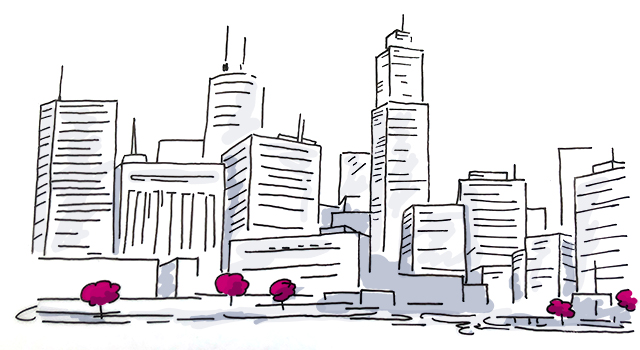
5 Ways Self-Driving Cars Will Forever Disrupt the Future of Hospitality
It might not be just around the corner, but it’s certainly down the road. Self-driving cars (or autonomous vehicles) are reaching a point where they’re as good, or better than human drivers. And companies like Google, Tesla, and Uber are each pushing the limits of innovation to dominate the space. In a recent report, Business Insider predicted that as many as 10 million self-driving cars would be on the road as early as 2020. So what do driverless cars mean for the future of the hospitality industry?
Let’s take a long leap 30 years or more into the future. Imagine a world where a majority of the cars on the road are self-driving autonomous vehicles. Also, for the sake of this article let’s presume that in this future, most commuters have given up on traditional car ownership in favor of car sharing services like Uber and Lyft. (Only now, both services feature a fully autonomous fleet of vehicles). So buckle up, and let’s see where this road takes us.
[Tweet “More than 10 million self-driving cars will be on the road as early as 2020.”]
Here’s a look at top ways self-driving cars will disrupt the future of the hospitality industry:

1. Self-driving cars will redesign our cities, leaving space for events in parking lots.
What’s the first major benefit of a self-driving car service? It may become much easier to find a parking spot. Actually, you might never need to think about parking a car in the first place. Your car will simply drop you off, and continue on its way to find another passenger. And it can continue to go all day, until it needs a recharge.
So what do we do with all the street parking spaces, parking lots and garages that we use today? All of this space is eventually going to be reclaimed. Creative hotel sales teams are already turning to parking lots adjacent to their property as additional space for outdoor events. If you own it you can sell it, the difference is that you’ll soon want to think of a more permanent solution. For example, converting parking spaces into mini parks or additional outdoor space that complements your indoor function rooms.
2. Event attendees will be more willing to travel to mid-tier cities.
We’re already seeing more demand in mid-tier cities. Air travel costs are dropping, and both leisure and business travelers are clamoring for new experiences in new cities. Self-driving cars are taking that trend and pushing it even further.
Soon, hotels will face an entirely new comp-set. Self-driving cars are going to have a major impact on domestic airlines. Imagine jumping into a self-driving car at midnight, going right to sleep in a comfortable lounge seat, and waking up the next morning just in time for coffee and bagels at a breakfast reception. Now every city within 500 miles of a property is a serious competitor. Look for massive growth in some unexpected cities over the coming decades.
3. Event attendees will be more willing to go to multiple venues.
In this future, event venues will need to look for ways to design new experiences for their guests and clients. It won’t be enough that your property is in a major city. Self-driving cars are effectively taking all the dots on the map and pulling them closer together. That means your property should be looking for ways to differentiate an offering beyond what’s bringing guests to your city in the first place.
Keep in mind that millennial travelers and event goers are looking for authentic experiences, even if you’re traveling for business. That’s why 1 out of 3 business travelers today book with Airbnb instead of a traditional hotel guest-room. For a venue looking to stay ahead of the trend, creative partnerships might be your best rout to entice travelers and groups. Remember, now that we’ve eliminated the burden of driving around town, event attendees will be far more likely to hop from venue to venue.

4. More alcoholic beverages might be consumed at events because of self-driving cars.
We won’t have to worry about drunk-driving when every driver is a robot. The best result of that is that driverless cars can significantly reduce the number of serious accidents on the road. That’s great news for the world at large, but it can also mean that travelers and event attendees will be open to having a few extra drinks.
In a recent Social Tables survey, 23% of event planners told us that the most costly budget item they’re faced with is Food & Beverages. It also happens to be the highest margin sales item for event sales team. Hoteliers are really good at negotiating higher rates for F&B. A bigger opportunity for drink sales is great news for hotels, but keep in mind that when transportation is significantly cheaper and easier, you’re also faced with even stiffer competition from venues nearby.
[Tweet “We won’t have to worry about drunk-driving when every driver is a robot.”]
5. Attendees will have more time to go to meetings and events because of time saved from driverless cars.
The average commute time in the United States is about 25 minutes. That’s nearly an hour round trip when you account for traffic. One of the biggest factors dissuading event goers these days is simply taking time out of the workday just to travel to the event. Which makes a ton of sense, given that most events we go to happen locally.
Self driving cars could give us back more than an hour each day. Which would make attendees more willing to take the extra hours out of the office. That is, as long as those self-driving cars are also equipped with zippy wifi speeds so we don’t miss out on a client email.
Now You Know How Self-Driving Cars Could Change the Hospitality Industry!

What’s your take? Eventually, self driving cars will disrupt every industry around us that’s tied closely to transportation. Do you think the hospitality world will feel the impact? Join us on Twitter to let us know.
And, check out or recent post predicting upcoming trends in the hospitality industry: The Next Five Years in Hospitality. Or discover other easy event transportation methods.
Want to learn more about self driving cars?
It’s nearly impossible to say with certainty whether completely autonomous vehicles will replace human-driven cars in the future. However, in recent years, we’ve seen the technology progress dramatically – such as the Budweiser driverless truck that made a delivery in Colorado in 2016, and the rate of technological development has not slowed down since the Renaissance, so it’s safe to say we’ll see more autonomous vehicles in the future.
As of July 2019, experts believe it will be at least 10-12 more years before completely autonomous vehicles will be sold to private consumers.
Self driving cars are being developed for a few main reasons. Firstly, the goal is to remove the possibility for human error on the roads, and improve safety. Driverless cars will also dramatically increase transportation efficiency, because they do not need to be parked – they can constantly be in use by society.


